|

the high line
Filippo Brancoli Pantera
_______________________
Draft 109: Wall Newspaper
Rachel Blau Duplessis
I. Of the Dead
(....)
Three languages, but now she could not speak, a symptom of her dying.
Olfactory hallucination as I wake: the smell of coffee brewing.
Being “born,” as Olson said, “not of the buried but these unburied dead.” “You must change
your life.” Me alone, or who?
Poetry — something “replete with signifiers and gibberish.” Makes a kind of sense.
They are predicting a lot of snow up the East Coast.
But I don’t feel bad. Can’t apologize (too much) for this pock-marked landscape.
Nevertheless, I feel terrible. “Why? April is the coolest month!” Can you say “parallel
universe”?
Occasional flowering is a normal characteristic. The poem’s not about the baby Christ child
just because the word frankincense is in it.
Severe choices of brilliant play. Temporality happens every day.
Let’s tie the hands of the assholes.
Alternative life: orthopedic surgeon. Hobby: trekking.
Keep your valuable properties with you at all times.
The social world drained back into the work; the dam was over-passed.
Chaos Became a Way of Life.
Canvas bags with a special logo got distributed to the task force.
...(more)

Happy Birthday
Rachel Blau DuPlessis
Drafting beyond the ending
Patrick Pritchett introduces a special feature at Jacket2 on Rachel Blau DuPlessis
(....)
To say that Rachel Blau DuPlessis has built her entire poetic project on the logic of the provisional and the contingent is no exaggeration. And reader, make no mistake — she has married us to this process. In the School of DuPlessian Midrash every seam and suture is exposed as a subject of instigation cum investigation. Investigation, in Drafts, is not simply a prod to the ethical; it’s heuristic: in teaching us how to read Drafts, Drafts teaches us how to read. (So maybe it’s chiasmatic, too?)
.....................................................
Draft 37: Praedelle
Rachel Blau DuPlessis
Hard. The dure of tradurre.
wide low arcdeep fields,
houses dotted, ho detto,
with shadow. And sun stark.
Stone and flesh, worry wort
no subtle word, true St. John’s Wort.
Grab a bite at their Fat Lamb Inn.
Unstatable. The what?
Crumbling. “White plenitude”
Red boots, sea frets, wool smell
blanket wet with interior dew.
Close eyes. To See well.
(....)
Assembling stagione
stations and stages
shades of unspeakable iotas
seasons and ages.
(....)
“High high high” : name fits
phonemes diversi, threaded lects,
words org. in threes. Solve Riddles?
“Well, it’s a fookin ‘ill, ain’t it”
Farfalle scamper and rise.
Kiting float. Stonewater jars
long peach lines of orrery
sunset orbitic law.
Bean of the sea-wall
chicken of the tree-well
lattice stripe language
high wind vowels
Chiaroscuro, and know why;
footnooted data, hypnic jerk
on the other side of verso
wads of salt grass lurk
...(more)
_______________________
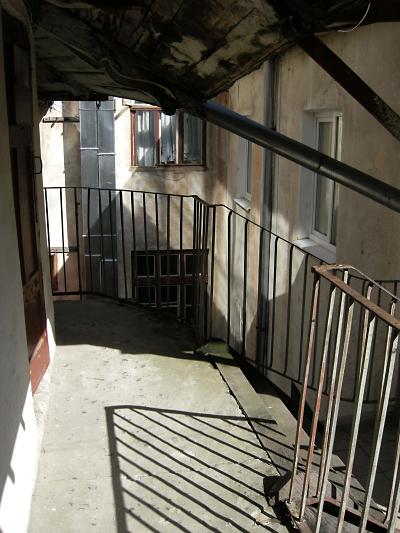
Russian Street 4
Studiolum
Poemas del rķo Wang
_______________________
Dr. Strange:
Newt Gingrich And Conservatism's Insane Idea Industry
Richard (RJ) Eskow
(....)
Gingrich may sound like the mad-inventor villain from a 1930's movie serial. But his eccentric concepts and pseudo-intellectual logorrhea aren't just the product of his own eccentricities. They're the natural flowering of a fifty-year trend in corporate conservatism which serves the agenda of the ultra-powerful in some very important ways.
Call him Dr. Strange. But Newt's not some Random Idea Generator who spews out whatever crazy notion his Id generates out of half-digested Popular Science blog posts. He's merely the latest in a long line of conservative 'thinkers' who play a vital role for Corporate America: They generate an ongoing barrage of radical ideas that, slowly but surely, help to undermine our country's shared social vision.(....)
Think of Gingrich as the secret love child of Milton Friedman and Howard Stern. Or of nuclear-war advocate Herman Kahn and Marilyn Manson. Newt's brand of conservative 'idea generation' is designed, first and foremost, to get lots of attention - which it has - and to make the values we've held for generations seem stale, rigid, and somehow less exciting than the futuristic corporate oligarchy of tomorrow....(more)
via Ethical Technology_______________________
The Nine Days of Godless Christmas
the new humanist

Antoni Tąpies
b. Dec. 13, 1923
_______________________
e-flux 30
The Future After the End of the Economy
Franco Berardi Bifo
(....)The shift from the industrial form of production to the semiotic form of production—the shift from physical labor to cognitive labor—has propelled capitalism out of itself, out of its ideological self-conception. Economists are dazzled by this transformation, as knowledge that had previously been structured according to the paradigm of bourgeois capitalism: linear accumulation, measurability of value, private appropriation of surplus value. The bourgeoisie, which was a territorialized class (the class of the bourg, of the city), was able to manage physical property and a measurable relation between time and value. The total financialization of capital marks the end of the old bourgeoisie and opens the door to a deterritorialized and rhizomatic proliferation of economic power relations. Now the old bourgeoisie no longer has power. They have been replaced by a proliferating virtual class—a deterritorialized and pulverized social dust rather than a territorialized group of persons—usually referred to as the financial markets....(more)
_______________________

Dante
Bookplates by Vladimir Zuev
From the collection of Richard Sica
50 watts
via
_______________________
Occupy Wall Street: Carnival Against Capital?
Carnivalesque as Protest Sensibility
Claire Tancons
e-flux
While some commentators and journalists have dismissed Occupy Wall Street as carnival, lawmakers and police officers did not miss the point. They reached back to a mid-nineteenth century ban on masking to arrest occupiers wearing as little as a folded bandana on the forehead, leaving little doubt about their fear of Carnival as a potent form of political protest. New York Times journalist Ginia Bellafante initially expressed skepticism about “air[ing] societal grievance as carnival,” but just a few days later she warned against “criminalizing costume,” thus changing her condescension to caution as she confirmed the police’s point: masking can be dangerous, Carnival is serious business.
(....)
Carnival hardly exists in the United States anymore. It has survived as a Shrovetide festival with Mardi Gras in New Orleans and as a summer celebration for the West Indian community with the Labor Day parade in Brooklyn. However, the carnivalesque—as a medium of emancipation and a catalyst for civil disobedience—is alive and well, and these contemporary carnivals have retained their rebellious potential....(more)
_______________________
World-Shifting
Charles Yu reviews Haruki Murakami's 1Q84
Los Angeles Review of Books
(....)
...when you read a book as long as 1Q84, you don’t just read it: you live with it for a while. If the book is good, you look forward to spending time alone with it. You sneak away from this or that, steal a few minutes here and there, find opportunities to get a few more pages in. Instead of life getting in the way of reading, the reading starts to get in the way of life. A very long book can even come to define a a kind of personal era, albeit a short one, a piece of time that you can look back on and remember as having a particular texture: from the global (ups and downs in the stock market, political unrest) to the personal (what was going on at the office, the songs that were on the radio). Whatever happened during that month gets woven into the experience. And the converse may also happen: The book inserts itself into your consciousness. It becomes associated with, and even part of, what happened to you during that period of your life. To read a novel of this length is to be immersed, to move back and forth between the fictional world and the real one, and in so doing, to see the latter through a point of view invented in the former....(more)
_______________________
Furtherance
J.H. Prynne
google books
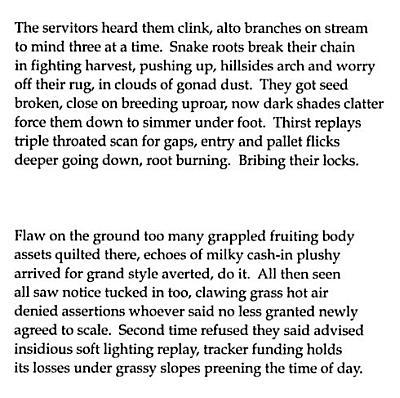
from Red D Gypsum
_______________________
Stars, Tigers and the Shape of Words
Williams Matthews Lectures 1992
J.H. Prynne
ifile pdf
_______________________
Open to Influence:
Jonathan Lethem on Reading, Writing, and Concepts of Originality
I’ve come to believe that there is something innate in my method, my sentences, and my approach to narrative and characters that’s inalterable, and that transforms these influences even when I’m not conscious of it. So I don’t ever think in terms of embarrassment or hesitation or reservations about being influenced or working with models. I pretty much assume that’s how it works for me.
I understand that a lot of other people are much more deflective or diffident or uncertain or unconscious about these processes, but I believe strongly that they’re what’s going on in making narratives for anyone. That is to say, I don’t see being open to influence as some kind of radical or postmodern or experimental or unorthodox proposition, I see it as a way of talking about what simply is the case, and always has been for writers of all kinds.
These levels of inhibition from talking about influence may represent a kind of contemporary condition. Certainly the frameworks for identifying influence or for being anxious about it or resisting it are very recent ones. I don’t think that these questions bedeviled people one way or another until relatively recently. So anytime people express surprise about my disinhibitions, I suspect that they’re responding to the discourse, not the practice. ...(more)
The ecstasy of influence: A plagiarism
Jonathan Lethem Harper's, February 2007
_______________________
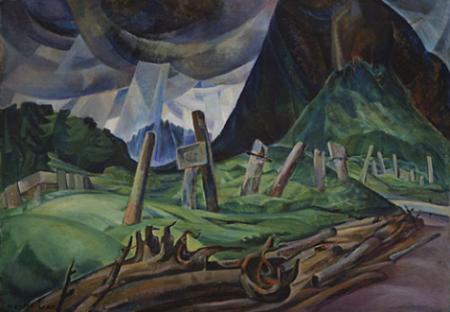
Vanquished
1930
Emily Carr
b. Dec. 13, 1871
_______________________
Not Beyond All Conjecture
John Ashbery
Oblivion scattereth her poppy, and besides
it’s time to go inside now,
feed the aggressive pets, forgive our trespasses
for trespassing against us.
Other times
monotony is like a cave, the air is fresh,
tedium tonic.
We lie in a museum of helpful objects,
leaning toward the accomplishment of a small,
complicated task, like sailors in rigging.
Something no American has yet achieved.
Wave Composition Issue Three
'Driven mad, the sea, unable to die of one single wave'
_______________________

sunset
over the trans-Canada highway
photo - mw
_______________________
When atheists fib to protect God
A certain breed of nonbelievers are anxious to avoid pointing out the real flaws of religion
Daniel Dennett
(....)
... the reason many theological questions continue to evade the bright light of rational inquiry is that they have been ingeniously crafted by theologians to do just that. As the traditional concepts of God, heaven and hell crumble in the collision with science, the theologians invent new, more “sophisticated” concepts to take their place. They are improvements only in the sense that they are more immune to falsification by any imaginable discovery. This is, of course, recognized by many, perhaps most, traditional religious leaders, who regard theologians as closet atheists, lapsed believers trying to hang in there....(more)
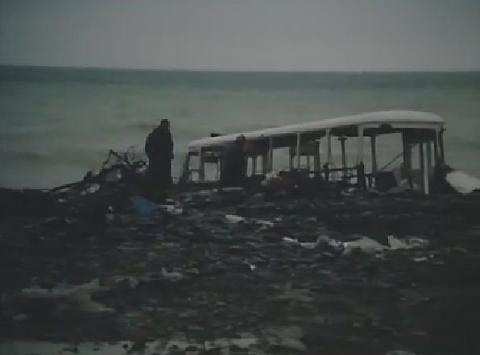
Visitor to a Museum
(1989)
(English subtitles)
Written and directed by Konstantin Lopushansky
youtube
via Dylan Trigg
In a post-apocalyptic world, in which a large part of the population consists of demented and deformed mutants being kept in reservations, a man embarks upon visiting the ruins of a museum buried under the sea which can only be accessed during low tide.
_______________________
Tidal: Occupy Theory, Occupy Strategy, No. 1 (2011)
Editors: Natasha Bhagat Singh, Amin Husain, Babak Karimi, Laura Gottesdiener, Isham Christie
For and Against Precarity
Judith Butler
(....)
When people amass on the street, one implication seems clear: They are still here and still there; they persist; they assemble, and so manifest the understanding that their situation is shared, and even when they are not speaking or do not present a set of negotiable demands, the call for justice is being enacted. The bodies assembled “say” we are not disposable, whether or not they are using words at the moment. What they say, as it were, is that we are still here, persisting, demanding greater justice, a release from precarity, a possibility of a livable life.
To demand justice is, of course, a strong thing to do. It also involves every activist in a philosophical question: What is justice, and what are the means through which the demand for justice can be made? The reason it is said that sometimes there are “no demands” when bodies assemble under the rubric of “Occupy Wall Street” is that any list of demands would not exhaust the ideal of justice that is being demanded. We can all imagine just solutions to health care, public education, housing, and the distribution and availability of food—in other words, we could itemize the injustices in the plural and present those as a set of specific demands. But perhaps the demand for justice is present in each of those demands, but also necessarily exceeds them. We do not have to subscribe to Platonic theory of Justice to see other ways in which this demand operates. For when bodies gather as they do to express their indignation and to enact their plural existence in public space, they are also making broader demands. They are demanding to be recognized and to be valued; they are exercising a right to appear and to exercise freedom; they are calling for a livable life. These values are presupposed by particular demands, but they also demand a more fundamental restructuring of our socio-economic and political order.(....)
... in some of our most vulnerable experiences of social and economic deprivation what is revealed is not only our precariousness as individual persons— thought that is surely revealed as well—but also the failures and inequalities of socio-economic and political institutions. In our individual vulnerability to precarity, we find that we are social beings, implicated in a set of networks that either sustain us or fail to do so, or do so only intermittently, producing a constant spectre of despair and destitution. Our individual wellbeing depends on whether the social and economic structures that support our mutual dependency can be put into place. This happens only by breaking with the neo-liberal status quo, enacting the demands of the people through the gathering together of bodies in a relentlessly public, obdurate, persisting, activist struggle that seeks to break and remake our political world. As bodies, we suffer and we resist and together, in various locations, exemplify that form of the sustaining social bond that neo-liberal economics has almost destroyed....(more)
_______________________
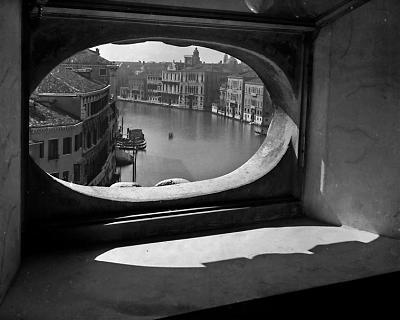
Le Grand Canal
1945
Francesco Ferruccio Leiss
(1892-1968)
via
_______________________
FIELD #85
(Fall 2011)
Muriel Rukeyser: A Symposium
Catacombs Of The Eye
On the ocean floor, find it. In the corner
store near the frozen dumplings, press it
into service. Soak the local: anarchy of milk
on a May Day tablecloth, the curtainless
shower swamp, the hand-twisted shirts
dripping from every curtain rod, an empty
rental flat. Outside, imbroglio of iron
flowers on canal fences above time
-sledged sidewalks. The rising canals
spill past stiletto-flexed calves
of street walkers, their moving picture
-esques. Sitting at attention, the veteran
of amputations, his glacial blue gaze,
his military cap in his lap like a sponge for change.
The glue-sniffing urchins slouched
on the crumbled window ledge
of the Currency Exchange, their faces
all edges. Their gray frames ashiver,
memorized, seized birds. The water
rises. Glut of the mouth, the unslaked eyes.
--Philip Metres
via Philip MetresBehind the Lines: Poetry, War, & Peacemaking
_______________________
International Review of Information Ethics
No 15: Ethics of Sharing (2011)
...has sharing of information a special virtue in the information society? How are choices of sharing or withholding of information justified? Is sharing subversive of the new global information regime, or an integral aspect of it?
This issue brings together contributions towards an ethics of sharing that embed the new technological potentialities linking them to their actual social impact. In our understanding, information ethics "deals with ethical questions in the field of digital production and reproduction of phenomena and processes such as the exchange, combination and use of information." So, the task of developing an ethics of sharing is both descriptive - helping us to understand the contemporary complexities of the ethics of exchanging information as it emerges from using digital technologies across a global range of social and cultural contexts - as well as normative - helping us to address blind-spots and clarifying possible ethical frameworks to address unresolved issues regarding these practices.
And what do we and should we finally do with the truly impressive contributions gathered here to provide answers to the above named questions and guidelines for the outlined task? We share them with you leaving them to your appropriate use - whatever you may make out of it.
_______________________
Journal of Evolution and Technology
Minds and Machines
Special Issue (Vol 22 Issue 1, Nov 2011)
_______________________
The Photographic Device as a Waiting Machine
Mauricio Lissovsky
(....)
The question I want to address here comes directly from Benjamin`s assertion: when and how does photography become a device in which the future might be nested? I believe the answer lies in the coming of modern photography, something that Benjamin’s generation witnessed, and whose difference, in relationship to classic photography, Bergson did not notice. To answer this question, we need to look at the photographic act no longer as presupposing docility – light rays smoothly printing reflections on a sensitive surface -, but as resistance; no longer as concerned with velocity, but instead delaying such velocity. I understand these dislocations to be crucial if we are to consider photography not merely as yet another technical device for producing images, but as an experience, in the deeper sense of this term. I do not wish in any way to imply that photography is not a technique – or that a camera is not a machine. Quite the contrary. For it is within the heart of technique that photography resists. It is within the instantaneous core of modern technique - when it appears to have reached its maximum acceleration - that the photographical device becomes not only an apparatus for making pictures, but also a waiting machine. ...(more)
Image & Narrative
_______________________
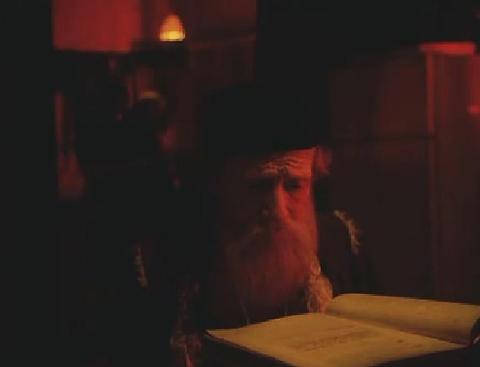
Visitor to a Museum
_______________________
A Very Hard Red
Frantz Fanon Fifty Year Years Later
Richard Pithouse
(....)
Fanon insisted that praxis must be rooted in the temporal, that each generation must confront the reality of its own situation. Our situation, speaking very broadly, is constituted by three primary forms of organised political force – party politics, civil society and popular politics. Although they often intersect they remain qualitatively different from each other. In the elite public sphere opposition to the increasing authoritarianism of the ruling party is generally presented as an intra-elite battle between contesting political parties and between the ruling party and civil society. The rebellion of the poor often appears as part of the background to this engagement, a phenomenon lending it urgency, in the manner that warming temperatures lend some urgency to the negotiations in Durban around climate change. The rebellion of the poor often appears as, to borrow a phrase from Jacques Rancičre, another contemporary philosopher, a space from which “only groans or cries expressing suffering, hunger or anger could emerge, but not actual speech”.
The hope that these scattered struggles tender is uneven, delicate and altogether uncertain. But in a world in which, from Tunis, to Cairo to Damascus and on to Athens, Madrid and New York, people, ordinary people, are constituting themselves as a political force outside of the contesting elites organised through the professionalised domains of electoral politics and civil society what else is there to do, really, other than to keep going, to keep the free flow of ideas circulating amongst all of us, to keep on singing against the riot police, squinting into the hard red?...(more)
The Wretched of the Earth
Frantz Fanon Translated from the French by Richard Philcox
with commentary by Jean-Paul Sartre and Homi K Bhabha ifile pdf
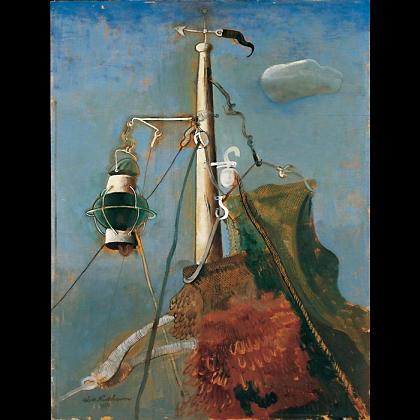
Boat Mast with Ship´s Lantern
1936
Felix Nussbaum
b. Dec. 11, 1904
_______________________
from The Gorky Variations
Jerome Rothenberg
"... posted 11.xii.11 in celebration of my birthday ..."
Variation One
The Pirate
draws blood from stone
or brilliance
that a paper bag
conceals
men on a journey
who can spy
their lord
in stones & rocks
their eyes askew
grown blue & hard
like glass or ice
lose colors
pale or shining
silver as the sea
might look from heaven
robots riding high
another journey starts
the pilgrim
like an iron man
breaks thru the snow
the lord’s flag
rises overhead
above the garden
laughter rises too
a voice calls
from a paper bag
blue snow
cold iron
ice within an inch
of where they wander
stone & iron
sounding in a dream
...(more)
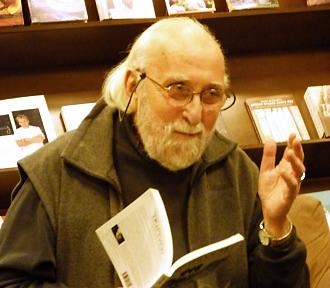
Jerome Rothenberg
b. Dec. 11, 1931
Jerome Rothenberg: The real revolution is tragic
Al Filreis
text of a talk presented in honor of Jerome Rothenberg on the occasion of his 80th birthday, at an event held at CUNY Graduate Center in New York, on December 9, 2011.
(....)
So why embrace modernism in particular in 1960? Not primarily because “supreme Yiddish surrealist vaudeville” can and would become in the 1960s and early 1970s one of the efficacious heretical counter-styles, though certainly in Poland 1931 such a mode helped carry the message — but because modernism after 1945 becomes a way of reckoning specifically with “the anti-modernism of the Nazi genocide of European intellectuals” (“Vienna Blood”) and so, as Jerry quotes Dennis Tedlock, “To tell these words is to happen the beginning again.” Or, through dada or alternatively through ancient sacred technicians, to enact “reversals in the history of language.” In Jerry’s “Holy Words of Tristan Tzara” we read that “logic is a complication – logic is always wrong!” but then at the same time we are reminded of the question: “How can a moral person live in an immoral world?” — a question, posed as such, in which the immorality is described in a language long and widely accepted as making sense; and we come to know that it is a question posed not by Tzara or Jandl or Schwitters, but by Mordecai Anielewicz, that barely postadolescent burning babe. Auschwitz, Jerry has written, is “an enormity that had robbed language of the power to meaningfully respond, had thus created a crisis of expression, for which a poetics must be devised if we were to rise, again, beyond the level of the scream or of a silence more terrible than any scream.”
(....)
if you put together Jerome Rothenberg's very first impulses toward archaic materials, manifested in White Sun Black Sun and New Young German Poets as (after total destruction) “telling words as a way of happening the beginning again” — as new burning-babe baby words (DA DA – KA KA) post-scream; and merge that tendency with the “supreme Yiddish surrealist vaudeville” as a means of Oral Torah, where “stabilization of the text would hinder and destroy the infintely moving, unfolding element within it” — that is to say, if you put those two tendencies together, you get the remarkable convergence of modernism and radicalism — of Euro-modernism and American radicalism — that we celebrate tonight.
...(more)
_______________________

Jose Gaytan
(1940 - 2011)
via
_______________________
From A Book of Witness Poems
Jerome Rothenberg
samizdat
Lose the Sound that Music Makes for Me
I seek a
dark trace
that is running from
my eye.
I would have died
without it.
Phantoms spilled it out
& said I had
no use
for it.
It gives me pleasure
too the more
I think of it
& run the risk of
living life
without it.
If my mouth
shuts down I
lose the sound
that music
makes for me.
I cry aloud
my final crack
at wisdom.
But the voice
inside me
has another
voice behind it
I can hear
when dreaming.
Something tastes
for me.
My mouth makes
funky music
while my fingers
fail.
...(more)
_______________________

Organ Grinder
Felix Nussbaum
1943 A Catalogue Raisonné
This picture index includes all the works known up to today of the artist Felix Nussbaum, who was born in Osnabrück in 1904 and who was murdered in Auschwitz in 1944
Felix Nussbaum and the Art of Resistance
John Felstiner reviews Felix Nussbaum: Art Defamed, Art in Exile, Art in Resistance
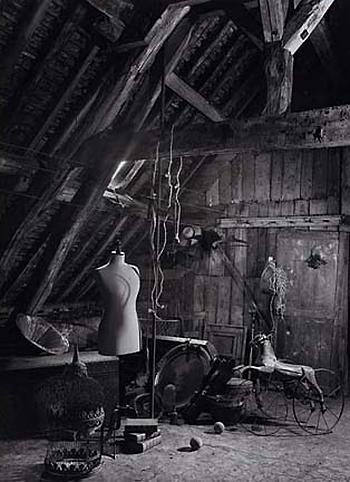
Emmanuel Sougez
1889 - 1972
1 2
_______________________
One need not be a Chamber -- to be Haunted --
One need not be a House --
The Brain has Corridors -- surpassing
Material Place --
Far safer, of a Midnight Meeting
External Ghost
Than its interior Confronting --
That Cooler Host.
Far safer, through an Abbey gallop,
The Stones a'chase --
Than Unarmed, one's a'self encounter --
In lonesome Place --
Ourself behind ourself, concealed --
Should startle most --
Assassin hid in our Apartment
Be Horror's least.
The Body -- borrows a Revolver --
He bolts the Door --
O'erlooking a superior spectre --
Or More --
Emily Dickinson
b. December 10, 1830
thanks to A la recherche du temps perdu
_______________________

The line of life
Rena Effendi
presented at Poemas del rķo Wang
Pipe Dreams:
A chronicle of lives along the pipeline
Rena Effendi
Visura
_______________________
Just one drop of forgetfulness
Gertrud Leutenegger
Translation: lp
(....)
Visibly lost in thought the doctor wrote out the bill by hand, paid me a noble complement, I gave him his money and stepped outside, profoundly perturbed, into the blazing heat of the Piazza della Repubblica. On my journey home to the north-western tip of the island my thoughts circled, as if seeking purchase, around the Marquis von O... again whom, so unexpectedly, I believed I had recognised in one of the portraits of the people born blind. And I thought, too, about the protective obliviousness which is no longer accessible to us today and to that blessing which Kleist bestows with such striking frequency, of fainting in situations where something incomprehensible is taking place. He dispensed this talent for being able to fall unreservedly unconscious all the more generously among his characters the less it was granted to him. Although in September 1800 he wrote, still facetiously, from Würzburg to his fiance Wilhelmine von Zenge about the ceremony of Latin Mass. "I am convinced that all these compounds do not inspire a single sensible thought"; in May 1801, with his Kant crisis already well behind him, he reported back to her, full of yearning, about a person praying ardently at the altar in Dresden: "Oh, just one drop of forgetfulness and with lust I would become Catholic." But Kleist's acute awareness of these dissonances and his feverish vigilance would remain with him right up until his death. Even his death, dealt by his own hand, and the puzzling and the shocking cheerfulness which surrounded it, was unable to conceal that it was marked by such courageous planing and extreme control.
...(more)
via Pierre Joris
_______________________
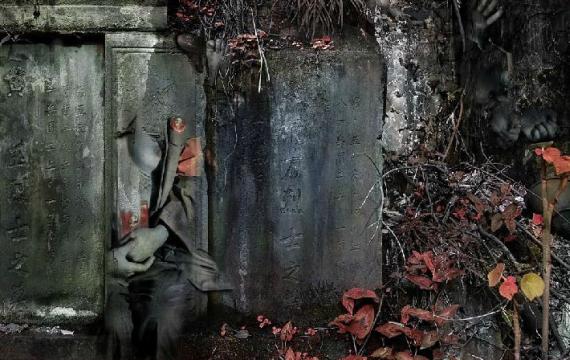
Cultural Evolution
Tian Taiquaqn
1 2 3
_______________________
Mémoires of Translation
Lawrence Venuti
eXchanges Journal of Literary Translation
(....)
Translation is a form of passive aggression. In doing it, a writer chooses to forgo original authorship so as to play havoc with a foreign original in a process of imitation, zigzagging between the foreign and receiving languages but in the last analysis cancelling the first in favor of the second. Is translation a socially acceptable form of literary vandalism? Or does it just require a distinctively warped frame of mind, one that secretly nurtures a refusal to kowtow to the authority of a foreign writer or text, that prefers to deliver the kick beneath the table?
No doubt, other translators will refuse to recognize themselves in this account, less a portrait than a provocation, seeing it as untrue as well as unflattering. Yet translation is such an instinctively performed activity, so many choices are made without the translator's full awareness, so many solutions found serendipitously, that the probability of unconscious motivation is very high--and too easily denied. The same might be said of what makes someone become a translator in the first place. I don't mean the practical details, like coming across an interesting foreign work or receiving a commission from a publisher, but rather conditions that are properly psychological and cultural. What experiences, I increasingly wonder, have released and maintained my own irrepressible desire to translate?...(more)
_______________________
Learning Through Digital Media
Experiments in Technology and Pedagogy
as part of MobilityShifts: an International Future of Learning Summit
_______________________
The Research Bust
Mark Bauerlein
(....)However much they certify their authors as professionals and win them jobs and tenure, essays and books of high scholarly merit in literary studies suffer the same inattention all the time. Why? Because after four decades of mountainous publication, literary studies has reached a saturation point, the cascade of research having exhausted most of the subfields and overwhelmed the capacity of individuals to absorb the annual output. Who can read all of the 80 items of scholarship that are published on George Eliot each year? After 5,000 studies of Melville since 1960, what can the 5,001st say that will have anything but a microscopic audience of interested readers?
To test that supposition, I devised a study of literary research in four English departments at public universities—the University of Georgia, the University at Buffalo, the University of Vermont, and the University of Illinois at Urbana-Champaign—collecting data on salaries, books and articles published, and the reception of those works. The findings:...(more)
via mobylives
_______________________
Is free inevitable in scholarly communication?
The economics of open access
Caroline Sutton
via DigitalKoans
_______________________
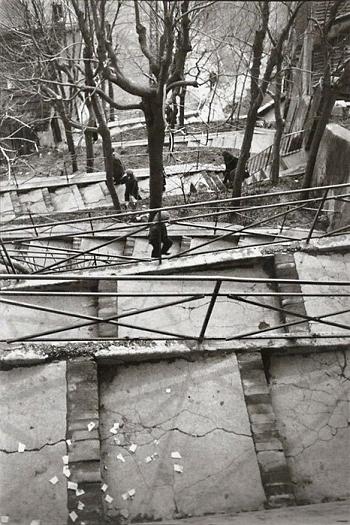
Henri Cartier-Bresson
1932
_______________________
Interview With David Graeber
The White Review
(....)
I find the word ‘protest’ problematic. With ‘protest’ it sounds as though you’ve already lost. It’s as though it’s part of a game where the sides recognise each other in fixed positions. It becomes like the Foucauldian disciplinary game where both sides sort of constitute each other. In that sense, Foucault was right: resistance is almost required to have power. Which is why I like the concept of direct action.
(....)
...the reason anarchists like direct action is because it means refusing to recognise the legitimacy of structures of power. Or even the necessity of them. Nothing annoys forces of authority more than trying to bow out of the disciplinary game entirely and saying that we could just do things on our own. Direct action is a matter of acting as if you were already free. ...(more)
_______________________
Frantz Fanon: Third world revolutionary
Martin Evans
(....)The Wretched of the Earth contained a preface by Jean-Paul Sartre that embraced Fanon’s vision. Within it Sartre warned that Europeans that they would find the book disturbing. Why? Because Fanon shows that, having thrown off colonialism, Asians and Africans no longer need Europe:
Europeans, you must open this book and enter into it. After a few steps in the darkness you will see strangers gathered around a fire; come close, and listen, for they are talking of the destiny they will mete out to your trading-centres and to the hired soldiers who defend them. They will see you, perhaps, but they will go on talking among themselves, without even lowering their voices. This indifference strikes home: their fathers, shadowy creatures, your creatures, were but dead souls… Their sons ignore you; a fire warms them and sheds light around them, and you have not lit it. Now, at a respectful distance, it is you who will feel furtive, nightbound and perished with cold. Turn and turn about; in these shadows from whence a new dawn will break, it is you who are the zombies.
This was why, Sartre underlined, Fanon was so significant. With The Wretched of the Earth he showed how the location of the revolutionary change had shifted in the mid-twentieth century. It was no longer to be found in the industrial proletariat of Lille or Manchester, whose revolutionary impulses had been dulled by the booming economic miracle in Western Europe, but amongst the dispossessed peasantry of the Third World.
(....)
... even if the Third World Revolutionary moment is now over, Fanon still exerts a crucial intellectual influence, not just in our understanding of racism but also as a key reference point in post-colonialism, one of the major theoretical debates of the last thirty years. Thus both Edward Said and Homi Bhabha look back to Fanon. For them Fanon’s legacy raises unresolved questions about power, race and cultural representation which continue to be pivotal as the post-colonial world grapples with the aftermath of Western colonialism....(more)

cathedral
Albert Gleizes
b. Dec. 8, 1881
_______________________
The Heavy Bear Who Goes With Me
Delmore Schwartz
b. Dec. 8, 1913
'the withness of the body' --Whitehead
The heavy bear who goes with me,
A manifold honey to smear his face,
Clumsy and lumbering here and there,
The central ton of every place,
The hungry beating brutish one
In love with candy, anger, and sleep,
Crazy factotum, disheveling all,
Climbs the building, kicks the football,
Boxes his brother in the hate-ridden city.
Breathing at my side, that heavy animal,
That heavy bear who sleeps with me,
Howls in his sleep for a world of sugar,
A sweetness intimate as the water's clasp,
Howls in his sleep because the tight-rope
Trembles and shows the darkness beneath.
—The strutting show-off is terrified,
Dressed in his dress-suit, bulging his pants,
Trembles to think that his quivering meat
Must finally wince to nothing at all.
That inescapable animal walks with me,
Has followed me since the black womb held,
Moves where I move, distorting my gesture,
A caricature, a swollen shadow,
A stupid clown of the spirit's motive,
Perplexes and affronts with his own darkness,
The secret life of belly and bone,
Opaque, too near, my private, yet unknown,
Stretches to embrace the very dear
With whom I would walk without him near,
Touches her grossly, although a word
Would bare my heart and make me clear,
Stumbles, flounders, and strives to be fed
Dragging me with him in his mouthing care,
Amid the hundred million of his kind,
The scrimmage of appetite everywhere.
.....................................................
In Dreams Begin Responsibilities and Other Stories
Delmore Schwartz
google books
_______________________
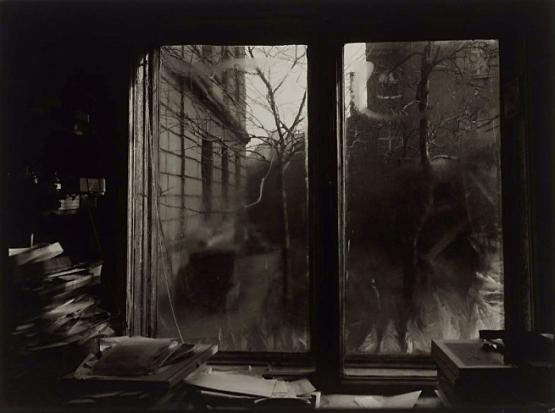
‘The Window of My Atelier’
Josef Sudek
1969
The Poet of Prague
(Josef Sudek)
youtube
Josef Sudek
by Charles Sawyer
_______________________
Tired And Unhappy, You Think Of Houses
Delmore Schwartz
Tired and unhappy, you think of houses
Soft-carpeted and warm in the December evening,
While snow's white pieces fall past the window,
And the orange firelight leaps.
A young girl sings
That song of Gluck where Orpheus pleads with Death;
Her elders watch, nodding their happiness
To see time fresh again in her self-conscious eyes:
The servants bring in the coffee, the children go to bed,
Elder and younger yawn and go to bed,
The coals fade and glow, rose and ashen,
It is time to shake yourself! and break this
Banal dream, and turn your head
Where the underground is charged, where the weight
Of the lean building is seen,
Where close in the subway rush, anonymous
In the audience, well-dressed or mean,
So many surround you, ringing your fate,
Caught in an anger exact as a machine!
_______________________

Saint Vitus Cathedral
Josef Sudek
1925–28
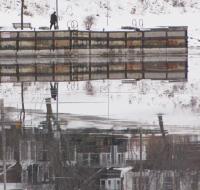
photo - mw
_______________________
Straight Lines
Yuan Qiongqiong
Translated by Kevin Hsu
Whenever she felt her mind was in disarray she would began drawing straight lines. It had been about four or five months since this began. Whenever she began to feel balled up, she would find a piece of paper and, with great care, began drawing straight lines. Holding the pen, she made a line straight across, leaving a trail of a long, somewhat quivering and crooked line. Even those quivering lines could calm her. She was drawing straight lines. Without distraction, she stared at her pen, connected to her wrist and her palm, as if it were a slender fingertip that had sprouted from the extremity of her body and flesh, leaving trails of long, frail moan-like lines. Of course, only ink flowed from out of the pen's tip, black ink, but she would always feel as if something would flow, too, out of the inside of her body, something vital, black, which evidently was her blood. Perhaps the blood inside of her had two colors, red and black, like some sort of cocktail, with a red layer and a black layer next to each other, never mixing, as if they had talked it over one with the other, to follow their own paths, only barely touching. Yes, she firmly believed that these two kinds of blood must flow through her body, the black being from him, having been polluted by him. Therefore when she drew straight lines and watched the black lines frailly but firmly trickling out from the extremity of her body, she would feel an indescribable sense of liberation, and an indescribable sense of joy.
She had never done this in front of him. She could not do anything else simultaneously while she was talking to him. She had to really concentrate, like if she did not focus all of her attention, the entire world would gradually, like liquid, melt and seep away. She had to concentrate hard. She stared at him, and stared at this world, as if the world depended on her gaze for its persistence. If she closed her eyes, this world would in that sudden moment topple, shatter, and vanish. She was like the monster in that myth that never slept, eternally with one eye open while the other eye rested, and at the moment when they switched, the world would be seen by both eyes, thus creating a parallel universe. That was what the book said....(more)
Two Lines Online: December 2011Center for the Art of Translation
_______________________

Alfred Eisenstaedt
b. Dec. 6, 1898
_______________________
In These Times the Home Is a Tired Place
Jessica Hollander
conjunctions
Part One
1. Only one dream the mother remembered: driving, dead bodies on the road, the word PAPER large and black on a billboard. Sometimes she made up different dreams when she woke panicked in the gray morning, imagining an airport chase, a lake drowning—but they weren’t really hers, only dreams she believed she should have instead of always the one: driving through death and the urge to pull over.
2. The girl spent a Saturday morning cutting snowflakes from a pile of paper she’d found on her mother’s desk. The snowflakes were peppered with sliced negotiations, diamond-pierced words like child and property and alimony, and when the girl finished she strung the flakes together and hung them from her window so they trailed to the berry bush and flapped in the stirred summer wind.
(....)
Part Two
1. Only one dream remembered: driving, dead bodies, the word PAPER large and black on a billboard. Sometimes when the mother woke panicked in the gray morning she imagined the dream continued—pulled over and the dead bodies woke up. They staggered toward her car with handfuls of colored fliers, shrieking, “Try this! Try this!” They covered her car with fliers until she opened her door and the dead surrounded her, pulled her limbs, called, “Come with me! There’s a saying! An expression! A humorous disposition you must try!” This is when the mother pushed off her covers and washed her face vigorously with hot water.
...(more)
Jessica Hollander_______________________
World Economics Association Newsletter [pdf]
Volume 1, Issue 1
December 2011
.. why has the WEA taken root so fast? Two big reasons come to mind.
One, rarely in history has a major profession been so in need of complete overhaul as economics today. And in many quarters this need is now openly discussed. Dimensions acknowledged as requiring fundamental redesign include economics’ paradigm, epis temology, ethics, socio-economic structure, technological formats and, not least, geographical representation.
Two, we are now living in a time when increasingly groups of humanity, sometimes very large ones, no longer feel powerless to resist traditional tyrannies. Tyranny takes many forms, including dogmatism and scientism. The latter in economics has meant requiring economists “to ape . . . what are supposed to be the methods of the natural sciences” (Karl Popper). Working together these two isms empirically emasculated key parts of our discipline, and the Global Financial Collapse awakened many of us to the devastating real-world effects that the faith-based approach to economics entails.
- Edward Fullbrook
World Economics Association
_______________________
The Art of Shrinking Heads:
The New Servitude of the Liberated in the Era of Total Capitalism
Dany-Robert Dufour
Translated by David Macey
mediafire pdf
Preliminary Remarks
... it would seem that capitalism works very well. So well that, one day, it should end up --- wasting away. The only problem is that it will not waste away until it has consumed everything: resources, nature, everything - up to and including the individuals who are its servants.
Is progress a mask that allows a discreet cannibalism to survive? Quite possibly. But what could capitalism possibly consume today? Bodies? It has been using them for a long time now, and the old notion of ‘productive bodies’ is there to prove it.‘ The real novelty appears to be the head-shrinking. It is as though the full development of instrumental reason (technology), which was made possible by capitalism, had resulted in a deficit of pure reason (the ability to judge a priori what is true and what is false, or even what is good and what is evil). It is precisely this feature that seems to me to be the truly characteristic feature of the so-called ‘postmodern’ turn: this was the moment when capitalism began to devote some of its intelligence to ‘headshrinking'.
In order to show how capitalism is now consuming minds, we will, throughout this book, relate their consumption to the rapid extinction of those modern philosophical forms of the subject which until recently served as points of reference and allowed us to think our being-in-the-world. The hypothesis I will be putting forward is basically simple but radical: we are currently witnessing the destruction of the double subject of modernity. I refer to the critical (Kantian) subject and the neurotic (Freudian) subject - and I do not see why I should have any hesitation about adding the Marxian subject to the list. And we are seeing the emergence of a new ‘postmodern’ subject. _______________________

transiberian
Thomas Breakwell
via
_______________________
The Communist Manifesto in Yorkshire Dialect
Steve McCaffery
Outsider Poems: A Mini-Anthology in Progress
presented by Jerome Rothenberg
The Kommunist Manifesto
or
Wot We Wukkerz Want
Bi Charley Marx un Fred Engels
Redacted un traduced intuht’ dialect uht’ west riding er Yorkshuh bi Steve McCaffery, eh son of that shire. Transcribed in Calgary 25 November to 3 December 1977 un dedicated entirely to Messoors Robert Filliou and George Brecht uv wooz original idea this is a reullizayshun. ...(more)
_______________________
The Politics of American God-Talk, 2010-2012:
Government as Sacrament, Government as Sacrilege
Dion Dennis
ctheory
Across the broad rhetorical commonalities (articulated by Beck and Obama-proxies) of Service, Hope, Faith, the Bible and God are arrays of exchanges about what constitutes the Sacred and Profane in the public sphere, tied to appropriate prescriptions and proscriptions for (or against) governmental action (or even governmental existence). These prescriptions and proscriptions are proffered in an environment of escalating debt, demographic transition, escalating anger and generalized anxiety, amid Boomer generational aging, decline and persistence. This essay tries to answer, at least in part, the following questions, cutting through the surface ideological talk: When Beck, Angle, Gingrich, Perry, Bachmann and others derisively label the legislative agenda and the ideology of the Obama-led state as "Progressivism," how does it come be characterized as if the work of a de facto Demiurge, a Manichean projection of a false God, masquerading as the True God? [14] Alternatively, how is it that Obama and his institutional and ideological allies invoke God and Scripture when they claim their work to be "righteous," as an expression of "The Social Gospel," the truest and best manifestation of God's Will? How do we usefully understand this current iteration of dueling claims that "God is on Our Side?" ...(more)
_______________________

Alfred Eisenstaedt
_______________________
The Jean-Paul Sartre Cookbook
October 10
I find myself trying ever more radical interpretations of traditional dishes, in an effort to somehow express the void I feel so acutely. Today I tried this recipe:
Tuna Casserole
Ingredients: 1 large casserole dish
Place the casserole dish in a cold oven. Place a chair facing the oven and sit in it forever. Think about how hungry you are. When night falls, do not turn on the light.
While a void is expressed in this recipe, I am struck by its inapplicability to the bourgeois lifestyle. How can the eater recognize that the food denied him is a tuna casserole and not some other dish? I am becoming more and more frustated.
October 12
My eye has become inflamed. I hate Camus.
October 25
I have been forced to abandon the project of producing an entire cookbook. Rather, I now seek a single recipe which will, by itself, embody the plight of man in a world ruled by an unfeeling God, as well as providing the eater with at least one ingredient from each of the four basic food groups. To this end, I purchased six hundred pounds of foodstuffs from the corner grocery and locked myself in the kitchen, refusing to admit anyone. After several weeks of work, I produced a recipe calling for two eggs, half a cup of flour, four tons of beef, and a leek. While this is a start, I am afraid I still have much work ahead....(more)
via Nag on the Lake
_______________________

photo - mw
_______________________
Containment
A.E. Stallings
So long I have been carrying myself
Carefully, carefully, like a small child
With too much water in a real glass
Clasped in two hands, across a space as vast
As living rooms, while gazes watch the waves
That start to rile the little inland sea
And slap against its cliffs' transparency,
Revise and meet, double their amplitude,
Harmonizing doubt from many ifs.
Distant frowns like clouds begin to brood.
Soon there is overbrimming. Soon the child
Looks up to find a face to match the scolding,
And just as he does, the vessel he was holding
Is almost set down safely on the bookshelf.
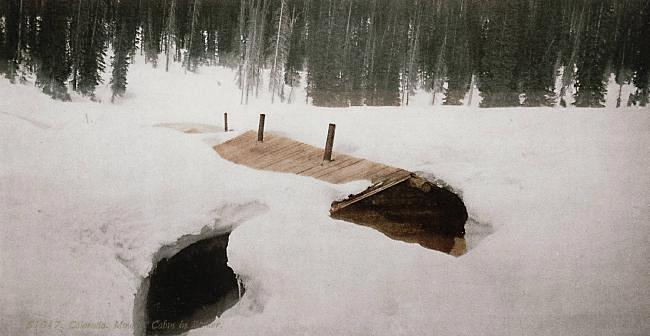
Detroit Photographic Company
Views Of North America, Ca. 1897-1924
Beinecke Rare Book and Manuscript Library
_______________________
from
The Chorus of the Secret Police [pdf]
(From a version of Antigone)
(....)
And men have grown inside themselves,
Minds that move further and faster than light
Or the changing air, and men invented speech
To trap the mind as it flew and so
To hand things down; and, above all, we have learnt
The intricate civilities of government,
How to make laws, how to avoid unhealthy places,
And how to escape from the rain and the wind
Into cities of jet and ivory.
But even as he makes, whatever
He makes, and no matter how much he makes,
Man longs to destroy the thing he has made.
Finding no enemy, he becomes his own enemy;
As he traps the horse, so he traps other men,
But the others strike back, trap closing on trap;
Having eaten enough, man must next build a wall
Around whatever food is left, and other men
Must pull down that wall! So the roof gets split,
And the rain and the changing air wash away
Whatever is left of man and his cities,
When men have done with them.

Christopher Logue
1926 – 2011
photo - Eamonn McCabe for the Observer
Interview with Christopher Logue
Christopher Logue, The Art of Poetry No. 66
paris review _______________________

Pike's Peak
American Tint
50 Watts
Detroit Photographic Co. photochromes
_______________________
Special issue on the Occupy Wall Street movement
Theory & Event
Volume 14, Number 4, 2011 Supplement
Actual Politics
Slavoj Zizek
(....)
In an old joke from the defunct German Democratic Republic, a German worker gets a job in Siberia; aware of how all mail will be read by censors, he tells his friends: "Let's establish a code: if a letter you will get from me is written in ordinary blue ink, it is true; if it is written in red ink, it is false." After a month, his friends get the first letter written in blue ink: "Everything is wonderful here: stores are full, food is abundant, apartments are large and properly heated, movie theatres show films from the West, there are many beautiful girls ready for an affair - the only thing unavailable is red ink." And is this not our situation till now? We have all the freedoms one wants - the only thing missing is the "red ink": we "feel free" because we lack the very language to articulate our unfreedom. What this lack of red ink means is that, today, all the main terms we use to designate the present conflict - "war on terror," "democracy and freedom," "human rights," etc. etc. - are FALSE terms, mystifying our perception of the situation instead of allowing us to think it. You, here, you are giving to all of us red ink....(more)
Return of a Repressed Res-Publica
Wendy Brown
To put the problem a little differently, partly through these broken solidarities, partly through demonizing the 1%, and partly through explicitly forging this new populist ethos, OWS has managed in spirit, analysis and conduct to substitute justice talk for interest talk. And it has done so when the language of justice seemed nearly extinguished by a neoliberal rationality that refracts all conduct through the metric of human capital self-appreciation. ...
Yet how difficult it has been for the mainstream media to grasp this new formation as promulgating a vision of justice, as issuing from educated political conviction and not only personal circumstance or individual rancor! It is a sign of our profoundly depoliticized vernacular of citizenship today that the stock interview question of OWS participants, "what brings you here?" is always intended to solicit a story of personal hardship or calamity. From CNN to NPR to the New York Times, the interviewers never know what to do with OWS answers that reference a decent, equitable and sustainable way of collective life, a sense of right and wrong, and an account of what we political theorists quaintly call The Good for the polity.
(....)
... Occupy Wall Street has already generated something extraordinary in its successful challenge to the neoliberal image of the nation on the model of the firm, where profit is the only metric, competition the only game, private property the only rule, winners and losers the only outcome, and hierarchy and inequality the only form of organization. In place of that image, OWS has revived the classical image of the nation as res-publica, the nation as a public thing. The struggle ahead? To make the image real....(more)
_______________________
This is what life in the USA is like nowadays: shit happens and shit un-happens, and you find out about it years later. Only a desperate and hopelessly degenerate nation would choose to live this way, in a law-optional society, in which money means everything, and yet nobody even knows what money is (or where it goes, and what it does when it goes there.)
- James Howard Kunstler
_______________________
I don't think the whole protest is only about occupying physical territory, but about reigniting a new political imagination. I don't think the state will allow people to occupy a particular space unless it feels that allowing that will end up in a kind of complacency, and the effectiveness and urgency of the protest will be lost. The fact that in New York and other places where people are being beaten and evicted suggests nervousness and confusion in the ruling establishment. I think the movement will, or at least should, become a protean movement of ideas, as well as action, where the element of surprise remains with the protesters. We need to preserve the element of an intellectual ambush and a physical manifestation that takes the government and the police by surprise. It has to keep re-imagining itself, because holding territory may not be something the movement will be allowed to do in a state as powerful and violent as the United States.
-
Arundhati Roy
_______________________
"Lie close," Laura said,
Pricking up her golden head:
"We must not look at goblin men,
We must not buy their fruits:
Who knows upon what soil they fed
Their hungry thirsty roots?"
"Come buy," call the goblins
Hobbling down the glen.
Goblin Market
Christina Rossetti
b. Dec 5, 1830
_______________________
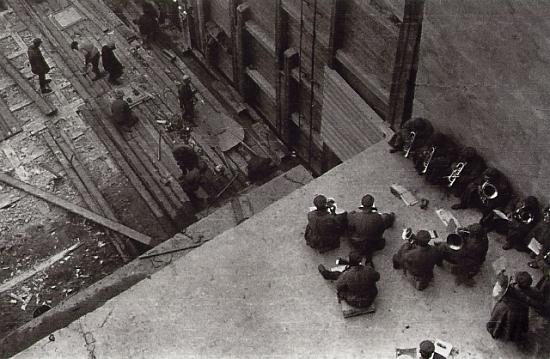
Working with an orchestra
white sea canal
1933
Alexander Rodchenko
b. Dec. 5, 1891
_______________________
Long Fasting Since
Renshi
Members of the Japan International Society:
Adam Clay, Goro Takano, Jane Joritz-Nakagawa,
Jeffrey Angles, Keiji Minato, Tokihiko Araki,
and Yoko Danno
(....)
[10]
when the birds of the mountains
cry out weeping
I suspect it is my father
I suspect it is my mother
when the deer from the ridges
come close in familiarity
I know how far
I am from the world
[Jeffrey]
[11]
And each time the thunder strikes the ground,
it is the first time I’ve heard it. Memory
grows bored with me or either I with memory.
Must sandpaper in a simile always be so rough?
Must doubting nature be required
to be an intricate or everlasting part of it?
[Adam]
...(more)
SHAMPOO 39
_______________________
James Lee Byars – Text of 100 One Page Stone Books
HTMLGIANT
(....)
21. I MADE UP THE CONSCIENCE OF THE EXHIBITION 22. THE PERFECT AUDIENCE IS TO TURN AROUND 23. HE KNOWS HOW TO TAKE COMPLIMENTS THANK YOU 24. MAMA WAS HIS DEATHWORD 25. SEE HOW HE SHOWS HIS NAME 26. TELL MY STYLE 27. THE EXHIBITION OF MR B. THINKING 28. I FREE YOU 29. THE SHOCK OF WRITING A LETTER 30. IT’S TOO BEAUTIFUL 31. THOUGHT IS PERFORMANCE 32. THE PERFECT DOOR IS A SPHERE 33. I CAN’T FIND A THING 34. PERFORM THE IMAGINARY STONE ...(more)
_______________________

Trendrine, Cornwall
1947
David Bomberg
b. Dec. 5, 1890
_______________________
Hold Out Hope: An Old Pep Talk
Brad Zellar
Your Man For Fun In Rapidan
(....)The mysteries don't scare me anymore. Someone once said that all silence is the recognition of a mystery, but I don't believe that anymore and I'm not sure I ever did. I think silence is many things (a sort of reading room or academy of mysteries, maybe), and many of them fine, but I don't think it's a recognition of a mystery. That's much too general. You might recognize a mystery in the loudest room or the most crowded street or in the face of a passing stranger or the furtive smile of someone you love.
When you do recognize a mystery, though --when you really recognize a mystery-- I believe you're compelled to address it, to try to speak its name and describe its features, to give it a face so that you will recognize and remember it until the end of your days. Because it's no small thing, the recognition of a mystery, even though it happens all the time and we may not even be properly aware of it. Still, I believe such recognition calls for some banging of pots and pans, some fireworks, some exultant noise.
...(more)
_______________________
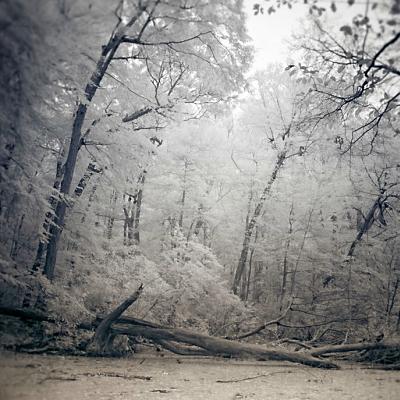
Mustard Gas Party
Brandon Merkel
_______________________
Ten untitled poems
Peter Reading
1946 - 2011
We have ditched most of the draff:
the unbidden spineless books,
the grot-gathering gubbins,
the outvogued vestments,
the cracked crockery,
the pot pig moneybox,
the Morecambe Bay mug,
the vintner's final demand,
the last-but-one's divorce papers,
the last home's deeds,
the chimp's wizened scrotum souvenir,
world's gear,
the bulk of the whole fucking shitheap.
That which remains is a cleared desk
and a time of appointment.
...(more)
Remembering Peter Reading

Enchanted Hills
Camp for the Blind
1950
Wayne Miller
_______________________
(....)
We live in an old chaos of the sun,
Or old dependency of day and night,
Or island solitude, unsponsored, free,
Of that wide water, inescapable.
Deer walk upon our mountains, and the quail
Whistle about us their spontaneous cries;
Sweet berries ripen in the wilderness;
And, in the isolation of the sky,
At evening, casual flocks of pigeons make
Ambiguous undulations as they sink,
Downward to darkness, on extended wings.
- Wallace Stevens, Sunday Morning
_______________________
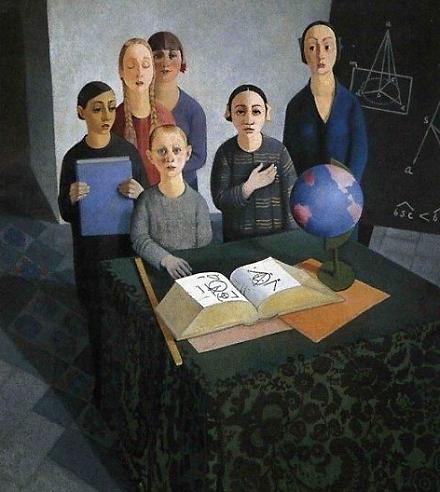
Gli scolari
1928
Felice Casorati
b. Dec. 4, 1883
_______________________
Two Poems
Paul Batchelor
manchester review
To Keenleysides
First, the overwhelming need to get out of the house.
Second, you like the smell: a resinous high note in the nose,
sharp enough – keen enough – to make a child blink.
Cut pine stood for something, each measured plank,
seasoned, expectant, trim, true. A smell smart as a whip,
quick as the clip you got for back-chat. Inside the shop,
sun-warmed copper and the dull shine of the stepladder.
A compartmentalised world, a masculine dream of order.
Rawlplugs. Bolt cutters. Nails and screws arranged in drawers.
Your favourite aisle: the endless row of coloured doors
opening on to nothing but more doors – no big bad wolf,
no wicked queen, nothing but a smell like promise itself
that keeps coming back as the aisles drift on forever;
and it’s cold like a shop shouldn’t be and you shiver
when a fork-lift truck wakes with a grumpy farting noise.
Here, a stack of pallets. There, a pyramid of tins that rise
like the wish to cry. This must be the world of work
everyone said was waiting for you. You could go back
to the brass doorknobs and house numbers and doorbells –
you could go back and make-believe you’re somewhere else
and the bonny-coloured glass, like the stuff in your porch,
has turned the place into, say, a draughty little church;
but look at you now. You’re making yourself look childish.
...(more)
Paul Batchelor_______________________

Felice Casorati
1949
Herbert List
Stephen Daiter Gallery
_______________________
Excerpts from the Duino Elegies
Rainer Maria Rilke
b. Dec. 4, 1875
translated by John Waterfield
The Tenth Elegy
That I may one day, leaving the vision of terror,
sing praise and glory again to assenting angels.
That of the heart’s clearly smitten hammers
none may fall weakly on flat, doubtful
or unsettled strings. That my streaming countenance
make me shine. That my hidden weeping flower.
How dear you will be to me then, nights of affliction.
Could I have taken you to me, comfortless sisters,
more kneelingly – could I have lost myself more
wholly in your loosened hair. We, the wasters of sorrows.
How we look out on their sad prolongation, wondering
if they will ever end. And yet they are
our lasting winter foliage, our dark evergreen of the senses,
one of the seasons of the inward year – nor just a
season merely, but bedrock, settlement, home, and dwelling.
Strange, though, are the streets of the City of Pain,
where in the false silence of mere noise
bursting out of the moulds of vacuity
the gilded monument boasts its tinsel glories.
...(more)
_______________________
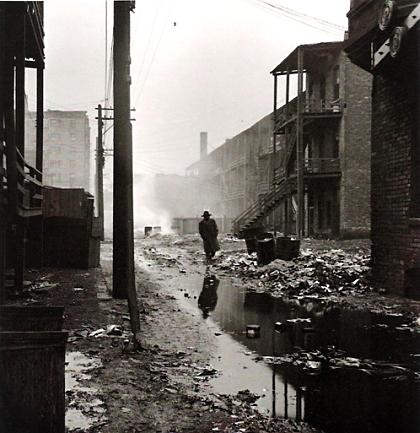
South Side of Chicago
Wayne F. Miller: Photographs 1942-1958
Stephen Daiter Gallery
_______________________
Rhetoric of Temporality
Paul de Man
mediafire pdf
At the moment that the artistic or philosophical...man laughs at himself falling, he is laughing at a mistaken mystified assumption he was making about himself.....As a being that stands upright...man comes to believe that he dominates nature just as he can, at times, dominate others, or watch others dominate him. This is, of course, a major mystification....Nature can at all times treat him as if he were a thing...In the idea of fall thus conceived, a progression of self-knowledge is certainly implicit: the man who has fallen is somewhat wiser than the foo who walks around oblivious of the crack in the pavement about to trip him up. And the fallen philosopher reflecting on the discrepancy between the two successive stages is wiser still, but this doesnt in the least prevent him from stumbling in his turn. It seems instead that his wisdom can be gained only at the cost of such a fall. The mere falling of others does not suffice; he has to go down himself. The ironic, two-fold self that the writer or philosopher constitutes by his language seems able to come into being only at the expense of his empirical self, falling (or rising) from a stage of mystified adjustment into the knowledge of his mystification. The ironic language splits the subject into an empirical self that exists in a state of inauthenticity and a self that exists only in the form of a language that asserts the knowledge of this inauthenticity.
in Blindness and Insight essays in the rhetoric of contemporary criticism
quote posted by Leah Rodriguez
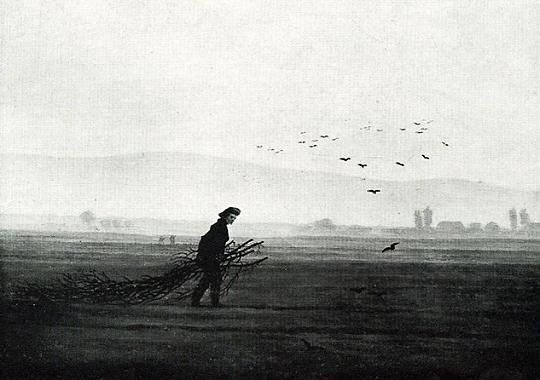
Autumn Landscape with Brush Collector
Caspar David Friedrich
ca. 1824
destroyed or lost: 1931
Lost Art: Masterpieces Destroyed in War
_______________________
The Man Who Buried Himself
Miguel de Unamuno
Translated from Spanish by Emily Calderwood Davis
It was extraordinary, the change that came over my friend. The jovial, witty, and carefree youth had become a melancholic, taciturn, and cautious man. His moments of abstraction were frequent, and in them it seemed as if his spirit were wandering the paths of another world. One of our friends, a diligent reader and decipherer of Browning, remembering the strange piece in which the poet tells us of the life of Lazarus after he was resurrected, would often say that poor Emilio had visited death. And all of the inquiries that we made to discover the cause of that mysterious change in character were fruitless.
But so much did I press him and each time with such insistence, that finally one day, revealing the effort it takes to make a very difficult and draining decision, all of a sudden he said to me: “OK, I’m going to let you know what has happened to me, but I beg you, in the name of whatever you consider most holy, not to tell anyone before I have died once more.” I promised him in all seriousness, and he took me into his study....(more)
Words without Borders
December 2011: The Fantastic
_______________________

Georges Seurat
b. Dec. 2, 1859
_______________________
Round and round
Olli Löytty
Translated by Hildi Hawkins
books from finland
(....)
When you increase the speed of the movie, you realise that many people go in and out of the house’s doors. It looks as if a revolving door has gone made and is, by turns, sucking people in and chucking them out – them and their belongings. The changing seasons follow their even cycle, leaves changing from browny-red and –yellow to deep green and then pale buds, finally disappearing completely into the wrinkles of the bare branches. The colour of the house brightens and fades, and the birch trees that stand outside it atrophy to saplings that are then dug up and carried away.
I derive particular pleasure from seeing the pastel-coloured two-storey buildings that went up behind the house in the 1980s and 1980s demolished; in their place rise little wooden houses with vegetable gardens. At some point, too, potatoes grow in the garden of my house.
I have been told that gazing backwards is an activity that increases with age. People begin to seek explanations of themselves in the past, their family roots, the places they have visited. Perhaps, in every person’s life, there is a watershed; once one has passed it, one turns one’s gaze back in the direction from which one has come. I myself am still travelling with my gaze fixed firmly forward, but on the level of ideas I understand the wisdom that is hidden in history. It is clear that I would not be as I am if I had not lived the kind of life I have lived, if my parents’ backgrounds and choices had not been those they were. And I would not be myself if I had not lived where I have lived, moved from place to place and finally ended up in the family home, the same house where my grandmother brought up her family and where my parents celebrated their wedding. My family’s path is a circular one, and I have clearly been unable, or perhaps even unwilling, to stray from it....(more)
_______________________
Magical Thinking
Ben Tarnoff reconsiders Edward Bellamy's Looking Backward
Lapham's Quarterly
(....)
Few novels have sought to improve America as radically as Edward Bellamy’s bestseller Looking Backward, 2000-1887, published in 1888. Bellamy, like Rand, used fiction to popularize a philosophy, and with comparable results: Looking Backward sold nearly half a million copies in its first decade and appeared in several languages around the world. The book found many prominent admirers, among them Mark Twain and William Jennings Bryan—the latter borrowed the language of his Cross of Gold speech from the novel’s final chapter. It inspired a political movement called Nationalism and energized generations of American progressives, from populists to New Dealers. More than a century later, it remains an indispensable zeitgeist book, an X-ray of the American body politic during the violent creation of modern industrial society, when many different futures felt possible....(more)
_______________________

Student at Columbia University
from 1948 for Look Magazine
Stanley Kubrick’s New York
_______________________
Vile Jelly
C. K. Williams
I see they’re tidying the Texas textbooks again.
Chopping them down to make little minds stay
the right size for the preachers not to be vexed
as they troll for converts, or congregants, or whatever.
Troll. As in “Fishing for Men.” As in “…for Christ.”
Here’s a fisher: a pre-biblical king on a slab. Captives.
The king with a not sharp spear is blinding the first,
thrusting then twisting it into the writhing man’s eye.
...(more)
The Threepenny ReviewIssue 128, Winter 2012
_______________________
UbuWeb Top Ten - December 2011
Selected by Geeta Dayal
_______________________
In Situ:
Site Specific Art, Digital Code and the Politics of Speed
Joan Hawkins
ctheory
_______________________
Wittgenstein Jr, as we call him, has been with us now for two weeks.
Spurious
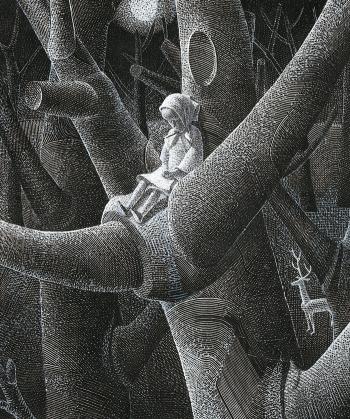 "The Blue Kerchief"
illustration for a fairy tale from Estonia
I see the world as a universe of giant forms
Illustrations by Alenka Sottler
50 watts
_______________________
Poems by Richard Taylor
again) (2)
We have agreed it is not only true or necessary to step around the Things, or to avoid the Spaces or the tremble of pulse and time that is the throb of light and of heat emerging even in these especial things in their special privileged places. We of these places and these Palaces have agreed. For, even in the very Very of the Silence Museum we now hear more clearly, and things more brightly and darkly enlight themselves: and indeed we move between, but in Our silent thought we are beginning to Be, again: for it is this, or partly thereof, that we have —
But here we have pause (for who are we?).
We have said that it is not the Things.
But, whence cometh they in these charged brigades of wounded time? (Ambiguous undules). And waves. The waves keep arriving. And difficult and tough is God in those ancient bloody vats. So. So we circle.
We circle in the dark where light falls softly as rain. We know we have not mastered the Silent Museum where Silent reigns and (it is said) (of the columns) (in the immense but deeply quiet Cathedral) that (perhaps) “tongue-less men placed them” (vast) … No! We have not mastered the Silence Museum where dusty silence reigns in great Red Brocades of lovely lace. Lace in such loops the Spider would envy. Warm and black. For we step now into the adyts, but there is no Wolf here. (And indeed there is an answering chuckle but we stiffen back to our rectitude).
Russian music. Eggs. Clocks. Bells. Drops. Deep.
Ancient in ancient Agony our heart clocks beat but —
...(more)
Look and look again
Twelve New Zealand poets
selected by Jack Ross jacket2
_______________________
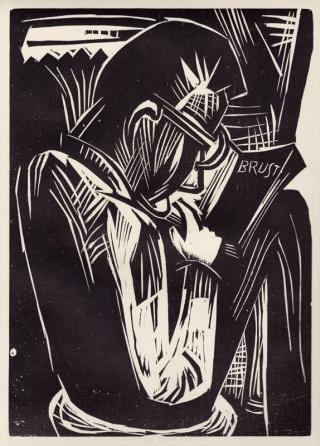
Karl Schmidt-Rottluff
b. Dec. 1, 1884
_______________________
“Ojos Sin Luz” (Eyes Without Light)
Dan Gettinger
Hannah Arendt Center for Politics and Humanities
(....)
The greatness of Occupy Wall St is that it gives people the opportunity to think. The absence of demands or a structured hierarchy allows the true problems that plague this nation to come first. It begins to cleanse the mind of all these barricades we've erected around ourselves by providing a space to talk about issues like class and privilege that we haven't confronted in decades. We've come to the threshold where unless we get a hard punch to the gut we'll continue to resort to phrases and slogans, packaging up our thoughts into sound bites and deluding ourselves with the belief that this is thinking.
David Graeber writes that the word revolution does not, and cannot, mean “a single, cataclysmic break with past structures of oppression,” a storming of the Winter Palace or Bastille. It is rather exposing and de-legitimizing the origins of an oppressive system, striking down the pillar of injustice that fuels our plight. Some of those in Occupy Wall St may say that pillar is the bankers that control our democracy. I say the roots of these dark times are within us. They’re the fictitious frames, the keyholes and the kissing booths that we use to define our world. A society predicated on constant caffeinated consumption, seeking desperate deliverance in passing fashions, is a violent one. One that seduces our imagination, leaving it languishing in infomercials and Italian leather. We may not be the cause of this crisis, but our complacency leaves us complicit....(more)
_______________________

Footpath
Karl Schmidt-Rottluff
1911
_______________________
Defeating our enduring fatalism
Sasha Lilley
(....)
For better or worse – often for worse – the left has a long history of diagnosing the death throes of capitalism and the final conflict heralding radical change. As the old witticism has it, Marxists have predicted ten out of the last two economic crises, a perpetual chronicle of a crisis foretold. Yet in the midst of what arguably is the fourth global crisis of the capitalist system, radicals – whether in North America or South Korea – find themselves adrift and tentative. We should be thankful for the departure of the old mechanistic view of the world, at least from most quarters. But what has taken its place? Anxiety about day-to-day survival has deepened the abiding anti-utopianism of our age. An enduring fatalism about the possibility of radical social transformation, the scar tissue of dashed hopes and sanguinary defeats, has us firmly in its grip. With the exception of a few pockets of militancy (and at times adventurism) the idea of organizing for a postcapitalist future commonly seems delusional: one thinks here of the now oft-quoted saying that it has become easier to imagine the end of the world than the end of capitalism. Another crisis, one of both vision and organization, is painfully in evidence.
It doesn’t have to be so. We are living through an era of considerable flux. Ideas alone won’t solve the crisis of the left, and revolutions cannot be summoned by fervent wishes. But ideas matter, as the often-tragic history of the left has proved. They are born out of action and shape the deeds of the future. They help us understand the world we unwittingly have helped to construct, grasp the many vulnerabilities of the current order and devise avenues for fracture and revolt....(more) .....................................................
Against the Grain:
A Program about Politics, Society and Ideas
hosted by Sasha Lilley
KPFA
_______________________
Occupy Wall Street's anarchist roots
David Graeber
(....)
When it comes to their most basic political sensibilities, most Americans are deeply conflicted. Most combine a deep reverence for individual freedom with a near-worshipful identification with institutions like the army and police. Most combine an enthusiasm for markets with a hatred of capitalists. Most are simultaneously profoundly egalitarian, and deeply racist. Few are actual anarchists; few even know what “anarchism” means; it’s not clear how many, if they did learn, would ultimately wish to discard the state and capitalism entirely. Anarchism is much more than simply grassroots democracy: It ultimately aims to eliminate all social relations, from wage labour to patriarchy, that can only be maintained by the systematic threat of force.
But one thing overwhelming numbers of Americans do feel is that something is terribly wrong with their country, that its key institutions are controlled by an arrogant elite, that radical change of some kind is long since overdue. They’re right. It’s hard to imagine a political system so systematically corrupt – one where bribery, on every level, has not only been made legal, but soliciting and dispensing bribes has become the full-time occupation of every American politician. The outrage is appropriate. The problem is that up until September 17, the only side of the spectrum willing to propose radical solutions of any sort was the Right.
As the history of the past movements all make clear, nothing terrifies those running the US more than the danger of democracy breaking out....(more)
_______________________
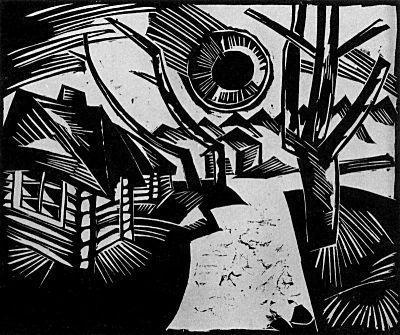
Russian Landscape with Sun
1919
_______________________
Pluralism and Anti-Pluralism in Economics: Homo Economicus and Religious Fundamentalism
John B. Davis
Abstract:
This short paper examines a possible connection between religion and economics in terms of the parallelism between the Homo economicus doctrine and the individual soul doctrine. The paper explores whether resistance to pluralism in economics as a methodological practice might be explained in terms of this connection. On this view, resistance to pluralism in economics is not a matter of economists holding methodological views about economics practice that are contrary to pluralism, but is rather a kind of anti-pluralism reflecting an intransigent defense of the Homo economicus view as a kind of core or ‘untouchable’ deep doctrine. Two arguments are advanced to demonstrate the parallelism between the Homo economicus doctrine and the individual soul doctrine.
|
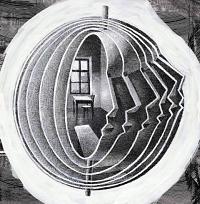
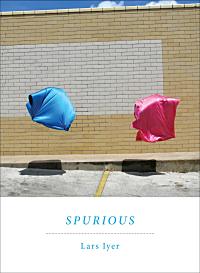


 The Age of Briggs & Stratton
The Age of Briggs & Stratton










































